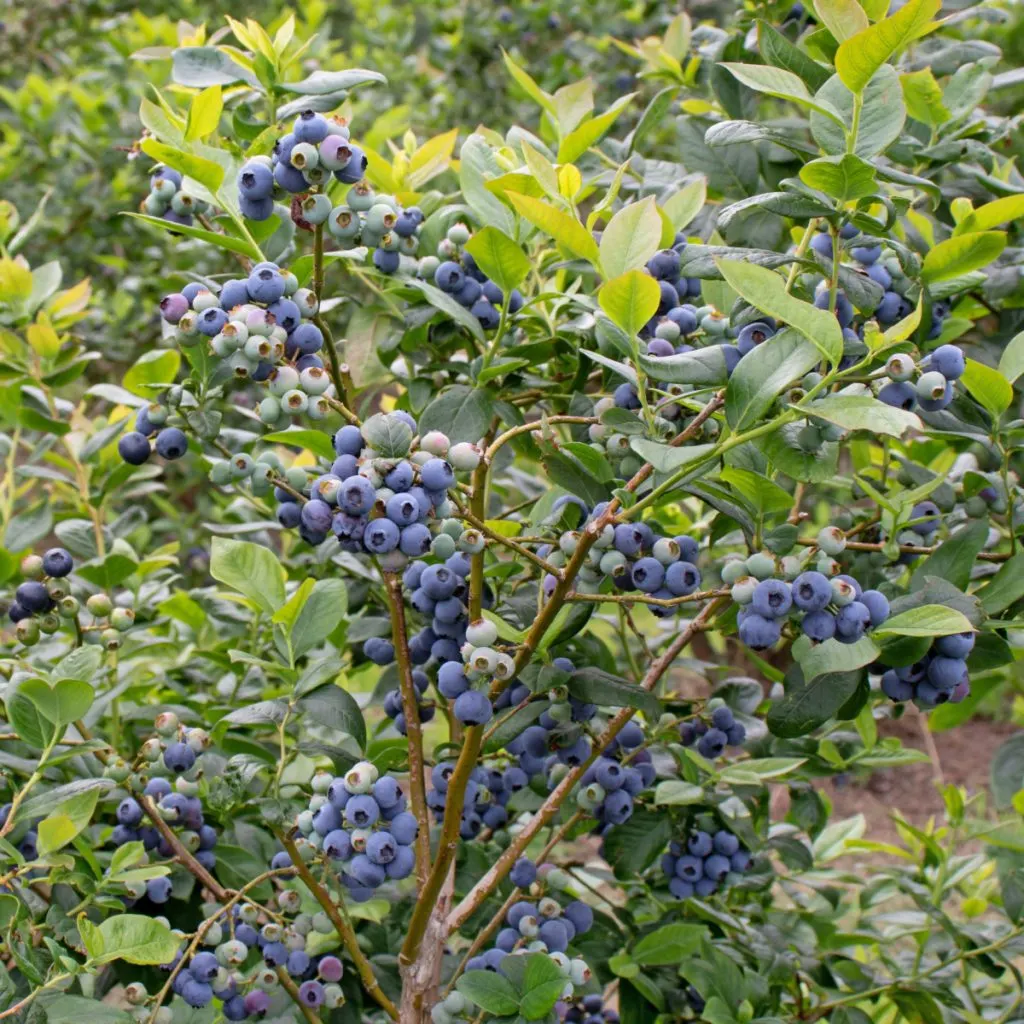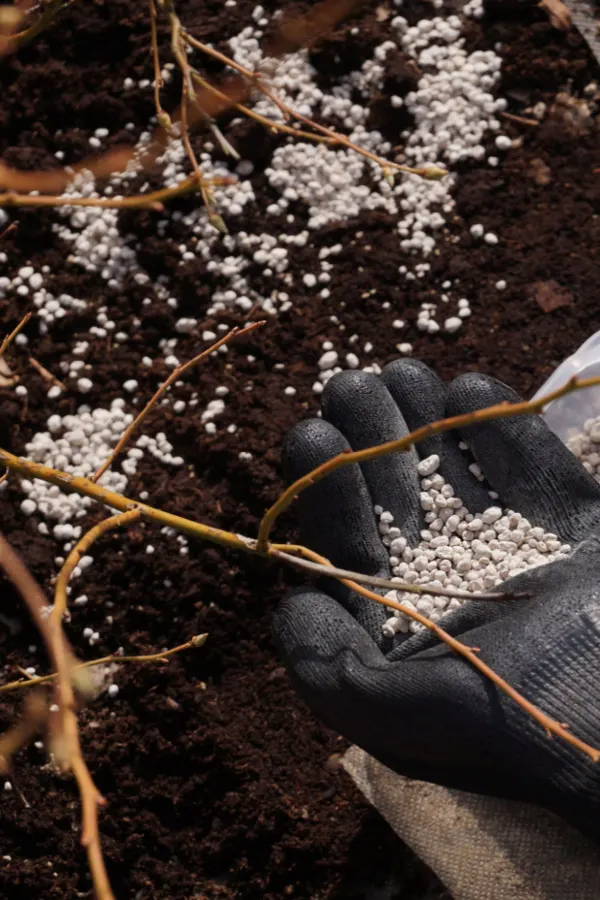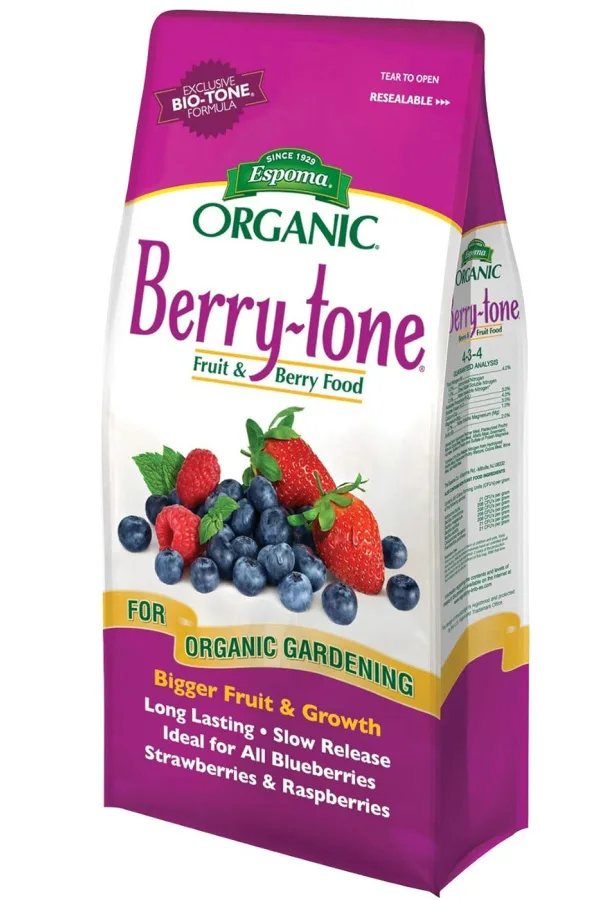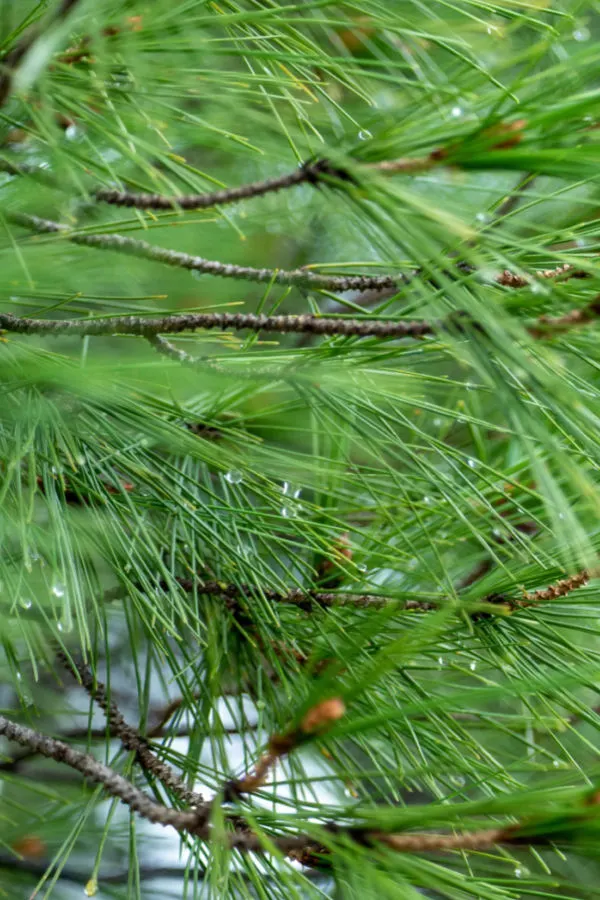One of the most important things you can do to help your blueberry bushes to stay healthy, strong – and produce a bigger harvest of blueberries is to fertilize them in just the right way, with just the right dose of nutrients.
But when powering up blueberry bushes, it’s not as simple as putting down a basic, all-purpose fertilizer. In fact, using a standard nitrogen based fertilizer is one of the biggest mistakes gardeners make when trying to supply their bushes with the energy they need to flower and fruit.
Why? Because even though blueberry bushes do need a source of nitrogen, as it turns out, the standard nitrogen (nitrate based) that is found in most all-purpose fertilizers is actually toxic to blueberry plants. Not only will using all purpose fertilizer not help your plants in the least, it can actually seriously harm them!

The Nutrients Blueberries Need – How To Fertilize Blueberries
So what specific nutrients do blueberries need to thrive? To answer that, it’s first important to cover what type of soil blueberries grow best in. Unlike many perennial plants, blueberries need to grow in soil that is slightly acidic, with a pH falling somewhere between 4.4 and 4.8 for optimum growth and production.
Because of that, what and how you feed them matters. Many fertilizers can actually change the pH of a soil over time. And for blueberries, that can mean trouble. Which is exactly why you need to select a fertilizer that is specifically made for acid loving plants.
In addition to selecting a fertilizer that acidic plants love, you also have to make sure it contains the nutrients they need most. And as strange as it may sound, a source of nitrogen is one of those that is extremely important for blueberries – just not standard nitrate nitrogen!
In place of traditional nitrogen, blueberries need a source of nitrogen that is an ammonium form. It needs to be with sulfur or sulfate-based, which is easy and safe for the bushes to absorb.

In addition to the right kind of nitrogen, blueberries also need equal amounts of phosphorous and potassium. These are important for both flowering, fruiting and overall plant health. Last but not least, the fertilizer must lean toward acid loving plants to keep the soil’s pH slightly acidic. Now let’s cover how to fertilize for more blueberries!
How To Fertilize Blueberries
Granular fertilizers are a very good choice for blueberries. They slowly feed the bush over time as they break down. In addition, they are also quite easy to apply around the base of the plant.
When selecting a granular fertilizer, look for one that is specific to blueberries or acid loving plants. Also be sure that it has an N-P-K ratio (Nitrogen, Phosphorous & Potassium) somewhere in the 4-3-4 to 8-4-8 range. Affiliate Link: Espoma 4-3-4 Organic Fertilizer For Blueberries
This will supply more than enough of the right kind of nitrogen to power growth. Even more, it also has the right balance of phosphorous and potassium for flowering and fruiting.

If you are planting new bushes, you will also want to give a dose of fertilizer in the planting hole. This will set great roots and get your bushes off to a fast start. See our article: How To Plant Blueberry Bushes For Success – Grow Incredible Blueberries!
Fertilizing At The Right Time – How To Fertilize Blueberries
As for when you need to fertilize your blueberries, there are actually 3 separate time frames to give your bushes the power they need – and you can use the same granular fertilizer for all three applications.
For each application, always follow the recommended dosage on the bag. It’s important not to over-fertilize. It can actually hurt a harvest more than help as blueberries do not perform well in overly fertile soil.
The first time to fertilize is in early spring before or as their leaves come out. This dose helps the bush come out of dormancy and store extra power for later fruiting. The second dose is best to apply about four to five weeks later after early spring fertilizing. This dose re-energizes your blueberry bush and sets the stage for strong flowering and later fruiting.
The last dose should go on right after your blueberry harvest is over. Although this dose may not help with producing more fruit, it does allow the plant to recover from producing its crop. And perhaps best of all, allows it to head into fall and winter without worry.
Check Out Our Podcast Below!

There is no need to fertilize your bushes in the fall. Late fertilizing, as is the case with many other perennials, can bring harm to your blueberries. This is because all of that power can force late growth. That late growth is then highly susceptible to freezing out over the winter months.
What About Compost? How To Fertilize Blueberries
When it comes to using compost around blueberries, you are usually better off keeping it away from your bushes. Yes, while it’s true that compost is loaded with easy to absorb nutrients, the pH makeup of it can sometimes lean toward the alkaline side. Especially compost from many home compost piles.
The issue with compost is that it can often change (raise) the soil’s pH over time. And when it does, it can actually be detrimental to its growth.
If you do want to add some extra all-natural organic power and help to your blueberry bushes, you can use either spent coffee grounds or green pine needles. Sprinkling a cup of grounds every month around your bush can give your blueberries a little energy without worry of changing the soil’s pH.
What If I Need To Lower My Soil’s pH – How To Fertilize Blueberries
If you have fertilized your bushes properly and they are looking lethargic or weak, it may be your soil’s existing pH level. The best way to check for this is by using a basic instant pH meter. You simply stick the probes into the soil and the meter will give you a quick level for pH.

If it is closer to alkaline and you need to lower it a bit, there are a couple of easy ways to go about it. The easiest is to use a soil acidifier. Product Affiliate Link: Jobe’s Organics Soil Additive / Soil Acidifier
You can also work in green pine needles around your plant’s base to help lower acidity. Green needles are acidic. And as they break down, they will release that and help to lower the pH. This will not work with old, reddish pine needles. At this stage, they are actually closer to a neutral pH and have little to no acidity.
Here is to powering up your blueberries with fertilizing, and to better health and a bigger harvest for your bushes too!
Simple Garden Life
Follow Our Facebook Page For Even More Great Tips! Simple Garden Life Facebook Page
Simple Garden Life is a website dedicated to keeping gardening fun, simple and enjoyable! We publish two new articles each week along with a new garden podcast episode every two weeks. This article may contain affiliate links.
